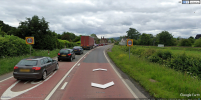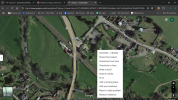Shrop
Member
- Joined
- 6 Aug 2019
- Messages
- 983
Yesterday evening (18th February 2025) at 6.50pm a pickup truck crashed on to the level crossing at Onibury in South Shropshire, completely blocking the railway. It was only by good fortune that trains were able to be stopped, as a train hitting this at line speed could well have been derailed, and had a train been passing the other way shortly after, then the result doesn't bear thinking about.

 www.shropshirestar.com
www.shropshirestar.com
As I understand it, drivers of trains who run red signals are punished heavily even though they may stop shortly after the signal and no harm results, and without even risking any obstruction of rail tracks. But after a career in road traffic, I've often wondered why drivers on roads seem to have such an incredibly relaxed set of rules where even dangerous, let alone "only" careless driving, which causes problems of a potentially very serious nature, routinely gets completely ignored. Plenty of technology now exists to counter bad driving (in-car warning systems, road junction camera enforcement etc etc.), and another 35 people WILL die on UK roads in the next week with many hundreds more suffering life changing injuries (these being people who right now suspect this no more than you and me do), and yet most of us just keep ignoring this frightening reality and very little gets done.
While we can be very grateful that this Onibury accident didn't lead to any loss of life on the railways (and it seems that the truck driver wasn't badly injured either) - isn't it about time that driving on the roads was taken very much more seriously, with more regular re-tests for drivers and more meaningful assessments of their capabilities? If we continue to brush bad driving under the carpet, then next time an accident such as this one at Onibury may have far more serious consequences, and then the authorities might wish they'd acted sooner. Is it just me, or perhaps we should see last night's accident as a warning that road driving really does need to be taken more seriously?

Pictured: Damage after van crash on level crossing as rail disruption continues
Trains are facing disruption between Shrewsbury and Hereford after a van crashed on a level crossing in south Shropshire.
As I understand it, drivers of trains who run red signals are punished heavily even though they may stop shortly after the signal and no harm results, and without even risking any obstruction of rail tracks. But after a career in road traffic, I've often wondered why drivers on roads seem to have such an incredibly relaxed set of rules where even dangerous, let alone "only" careless driving, which causes problems of a potentially very serious nature, routinely gets completely ignored. Plenty of technology now exists to counter bad driving (in-car warning systems, road junction camera enforcement etc etc.), and another 35 people WILL die on UK roads in the next week with many hundreds more suffering life changing injuries (these being people who right now suspect this no more than you and me do), and yet most of us just keep ignoring this frightening reality and very little gets done.
While we can be very grateful that this Onibury accident didn't lead to any loss of life on the railways (and it seems that the truck driver wasn't badly injured either) - isn't it about time that driving on the roads was taken very much more seriously, with more regular re-tests for drivers and more meaningful assessments of their capabilities? If we continue to brush bad driving under the carpet, then next time an accident such as this one at Onibury may have far more serious consequences, and then the authorities might wish they'd acted sooner. Is it just me, or perhaps we should see last night's accident as a warning that road driving really does need to be taken more seriously?




